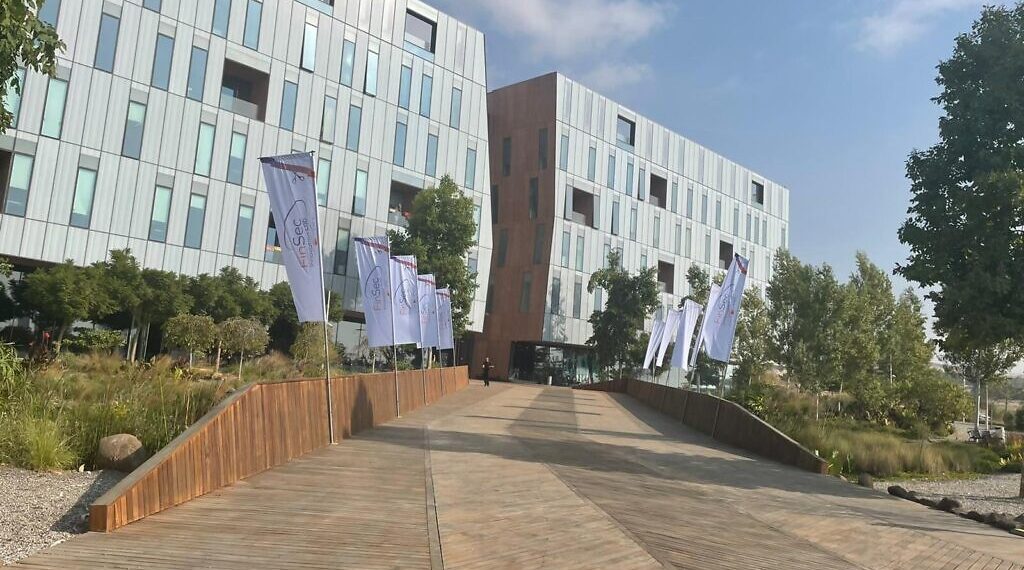Financial services giant Mastercard officially opened a new innovation lab in Beersheba this month, with a mission to work with early-stage Israeli startups on fintech (financial tech) and cybersecurity solutions for the payments and energy industries worldwide.
The new center, called the FinSec Innovation Lab, is operated jointly by Mastercard and Italian energy multinational Enel X after the two corporations won a tender in 2019 issued by the Israel Innovation Authority together with the Israel National Cyber Directorate and the Finance Ministry.
The lab has a number of focus areas including API (Application Programming Interface) security, vulnerability management, ransomware, digital identity and authentication, virtual payment wallets, and fraud prevention, said FinSec Innovation Lab CEO Sidney Gottesman.
“Anything that Mastercard or Enel can use to protect themselves or to provide to their respective customers,” Gottesman told The Times of Israel on Sunday. Gottesman is senior vice president of Corporate Security at Mastercard, and the program owner for employee identity and access management. He previously held senior roles at Bank Leumi USA and Citigroup.
The FinSec Innovation Lab is currently working with five Israeli startups to help them develop and test their solutions at the new center in Beersheba, offering the physical space, services, mentorship, and real-world data with which the companies can perform simulations of complex financial processes and cyber product testing, said Gottesman. The startups will also be able to receive funding from the Israel Innovation Authority.
The program runs for six months, after which a second group of companies will be selected.
Gottesman said that the lab vetted more than 100 applicants following its call for applications in January, and settled on the five startups that will now develop and conduct proof-of-concept (PoC) demonstrations: Imvision, founded in 2016, which specializes in protecting business applications from API attacks; Rescana, which developed a risk assessment platform for risk and security managers; Mirovia Security, which offers AI-powered cybersecurity for users of web applications and software-as-service (SaaS); Connected Insurance (formerly Apfie), which built an API platform for the insurance industry; and Kenbi, a fintech startup founded earlier this year that enables cross-country card transactions to be approved that could otherwise be declined in traditional payment models.
“The world is undergoing a profound digital transformation which requires innovative solutions to make life easier while ensuring information security and data protection for organizations, institutions, and private consumers,” Gottesman said earlier this year when the call for applicants was issued.
Gottesman said the initial plan for the lab “resonated with certain Mastercard strategic themes, namely cyber[security], fintech, innovation, and government engagement.” Mastercard, he said, has in recent years, “made some $1 billion in acquisitions and investments in cybersecurity, and fintech platforms.”
The payments giant is “very committed” to working with governments on innovation, he said.
Mastercard and Enel X held a ribbon-cutting event for the lab last week, hosting officials including Yigal Unna, director-general of the Israel National Cyber Directorate, Innovation Authority CEO Dror Bin, and Beersheba Mayor Ruvik Danilovich.
The FinSec Innovation Lab in Beersheba joins Mastercard’s startup engagement programs in cities such as Dublin, New York, Vancouver, and Sydney. Mastercard maintains its Israeli headquarters in Tel Aviv.
Enel opened an innovation hub in Tel Aviv in 2016 and has collaborated with local startups in fields such as the Internet of Things, cybersecurity, e-mobility, and energy storage.
Unna said in a statement that the new lab was a “unique venture that combines startup companies, multinational corporations, financial regulators and government bodies, with the aim of developing solutions to future challenges facing the companies involved, the city of Beersheba and the entire ecosystem.”
Bin said “cyber defense in the financial field is of great importance given the challenges we face today” and that “the lab will offer unique infrastructure, knowledge and expertise…to entrepreneurs and startups in order to strengthen the financial industry in Israel… and encourage growth and competition in the local sector.”
Israel is a leading player in the global cybersecurity sector, with local startups drawing record investments this year, as others made their debut in the public markets. According to the Israel National Cyber Directorate, the funds raised by cybersecurity companies in the first half of 2021 accounted for 41 percent of the total funds raised by cybersecurity firms worldwide. More than a third of worldwide cybersecurity unicorns (private companies valued at $1 billion or more) were Israeli with some 13 in Israel out of 30-33 globally, the directorate said.
At the same time, Israel is also a major target of cyberattacks. A large-scale Google-backed study published last month found that Israel was the country most affected by ransomware since 2020.
A sharp rise in such attacks in the US sparked a new Jerusalem-Washington agreement last week supporting information-sharing related to the financial sector such as cybersecurity threat intelligence; staff training and study visits to promote cooperation in the area of cybersecurity; and cross-border cybersecurity exercises linked to global financial institutions’ financial and investment flows.
The city of Beersheba is home to a number of cybersecurity research and developments centers set up global multinationals including — most recently — Japanese IT giant Fujitsu.
Credit: Source link



















